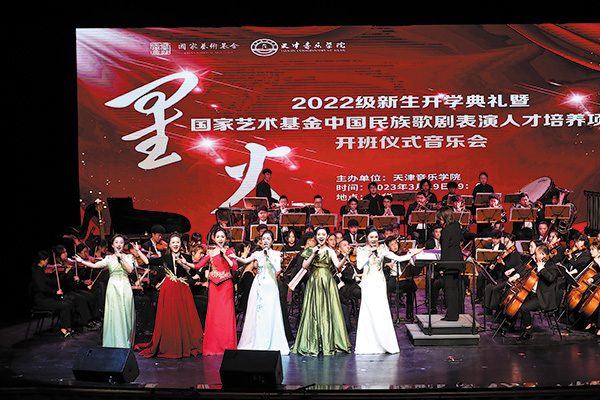Combining the best of both worlds

The program pairs trainees with noted singers, researchers and professors with the aim of better presenting Chinese cultural traditions on the world stage.[Photo provided to China Daily]
A training program on "Chinese opera" — Western opera infused with the characteristics of Chinese folk songs — being held at the Tianjin Conservatory of Music, is attracting nationwide attention.
The program also involves the examination of traditional Chinese drama.
Beginning in mid-March, more than 30 trainees, leading opera singers, researchers from top troupes and art college professors are participating in the project, which is set to last for 30 days and is supported by the China National Arts Fund.
Many of the trainees have won national or provincial-level art awards.
Wang Hongwei, vice-president of the conservatory and a renowned tenor, says the training "is aimed at boosting China's excellent traditional culture, better spreading Chinese voices and conveying Chinese spirit".
"The training is based on the profound experience accumulated by the conservatory's faculty and leading artists in China, expecting to boost the country's unique Chinese opera form, which integrates independent compositions and folk arts with Western opera," he says.
Among the lecturers offering the training are more than 35 leading artists and scholars in the sector.
They include leading singers Guo Shuzhen and Yan Weiwen, composer Yin Qing and director Li Xincao, to name just a few.
"They are now offering lectures, body and figure training and performance practice to those trainees, as well as conducting one-to-one interviews with trainees, in a bid to improve their comprehensive capabilities in understanding music and drama, their singing skills, and to upgrade their performance capabilities," Wang says.
He adds: "As an artist, in my personal career as a singer, an opera performer and now an art college head, I have found that it is of great importance to boost cultural prosperity by ensuring the younger generations inherit the arts, and by sustainably educating and fostering younger artists."
The training program is a key step to tackle the challenges facing further innovation, Wang says.
Wang Mingliang, director of the Management Center of the China National Arts Fund, says that over the past 70 years, the country has seen the integration of Western opera, which is touted as "the brightest jewel in the crown of art", with Chinese ethics, philosophies and traditional cultures.
"We expect China will open a new chapter in the art form," he says.
Prime examples of Chinese opera include The White Haired-Girl, performed in nine countries, including Poland, Hungary and Romania, in the 1950s.
The opera toured Japan in the 1950s.
The Red Guards on Lake Honghu and Tang Xianzu the Playwright in Concert were performed in Sydney in 2018 and 2019, respectively, and greatly impressed foreign audiences.
A recent opera enjoying widespread acclaim is Minning Town, which depicts the relocation of villagers in Xihaigu, Ningxia Hui autonomous region, under the guidance of a capable Party cadre, and is an ode to China's achievements in poverty alleviation.
In the opera, the mixture of traditional Chinese folk arts and the Western opera style has created a new harmony, says Lei Jia, a top soprano who is also a trainer for the program held in Tianjin.
Hao Liangliang, vice-dean of the School of Music at Shaanxi Normal University, who is a trainee of the program and a tenor, says: "The project has given us rare opportunities as artists and educators, because we share a common ground that we hope will push culture, research and performances to new heights."

Copyright © Tianjin Municipal Government.
All rights reserved. Presented by China Daily.
京ICP备13028878号-35



